Ever since survivors of brutal fighting in the Kasai region of the Democratic Republic of Congo fled to the city of Kikwit in 2017, the Mennonite Brethren Church has been ministering to them with faith and action.
The survivors came with burns, wounds from machetes, and babies about to be born. They were exhausted from walking for weeks or months from various regions of neighbouring Kasai Province with little food or water. They carried emotional wounds from watching their family members and neighbours massacred.
The Communauté des Eglises de Frères Mennonites au Congo (CEFMC; Mennonite Brethren Church of Congo), which is based in Kikwit, saw the need. Individuals with CEFMC took people into their homes and provided clothing and food. The CEFMC hospital staff provided medical care, and their churches became temporary shelters.
Of the more than 24,000 people who had fled to Kikwit by the end of 2017, CEFMC supported nearly 3,000 the following year with the support of Anabaptist organizations around the world. Mennonite Central Committee (MCC) worked with CEFMC, training them to carry out equitable food distribution and development programs, brought in Canadian Foodgrains Bank for food distributions and continues to fund ongoing programming today.
Trauma training
The arrival of displaced people in the community caused conflict, says Jacqueline Kafuti, who was the first CEFMC elder to invite people to live in her home. Other neighbors hosted people from Kasai too, she says, but there were those who pushed the newcomers aside because resources were already limited.
In addition, some displaced people acted out because of the trauma they had experienced, says Kufutama Kafaire, a member of the CEFMC local committee who handles finances.
“Someone who is displaced because of war—his head is troubled. It looks as if the war has been following him even where he is,” Kafaire says.
Providing equal education was one way that CEFMC helped to strengthen the connection between locals and the new arrivals. By giving school supplies to primary school students and paying secondary school fees for displaced teens, the burden on host families was lifted. CEFMC also provided trauma training for teachers.
Colette Koy Mazao, whose sixth-grade class doubled in size with the arrival of displaced children, said she struggled at first because displaced children self-segregated in the back of the classroom and did not speak the local language of Kikongo or the academic language of French.
Some displaced children were violent. Others would sometimes cry when she called on them. When she asked why, they said: “We are thinking about the situation that we have passed through.”
The training has shown Mazao and other teachers the importance of mixing students together in the classroom instead of allowing them to sit in separate groups. Teachers organize outside activities so that students from both groups are on the same teams together.
In the classroom, Mazao says she has learned to pay more attention to the emotional needs of the displaced children by drawing them aside when they look upset. If a student is absent often or sick, she visits the student’s family to see if there is a problem she can help to resolve.
Mazao also has learned to be less serious in the classroom and joke with the children, she says. “It has helped not only the displaced children, but all the pupils to live in peace with everybody.”
She’s happy that one of the displaced children in her classroom is at the top of the class academically this year. He also helps her monitor the classroom behaviour when she is absent.
“Things didn’t change so quickly,” Mazao says. “We worked progressively. Now there is a change.”
Complexity of help
At the CEFMC hospital in Kanzombi, staff struggled initially with the behaviour of people who were displaced. Dr. Jacques Tangudiki, a member of the CEFMC local committee who is responsible for health care, said displaced people demanded to be treated first and tended to be violent and noncompliant with treatment. This created tension.
“Imagine your father was murdered in front of you; your mother was raped in front of you. They were living with all of this,” says Tangudiki. Sometimes they would express that anger when there didn’t seem to be a reason for it.
Tangudiki says the nurses have learned from trauma training to understand people’s trauma responses and how to help people deal with their emotions. The hospital also provides primary care to displaced people for free, including disease prevention and medication for common ailments such as malaria and waterborne diseases.
CEFMC has also worked with MCC to lower the rate of waterborne diseases, which cause nausea, vomiting and diarrhea, by drilling two boreholes (deep wells). Potable water from a borehole drilled in Kanzombi in 2021 has significantly reduced waterborne diseases treated at the hospital.
Clean water has improved the health of thousands of people in Kikwit. It also reduces the fighting that commonly took place at remote springs where people used to get their water, even though it wasn’t potable. Youth, whose parents expected them to get water multiple times a day, would fight over who could access the single water pipe first.
Now that the boreholes are located near where people live, adults can get water throughout the day. They have time to get water and work together in the fields that CEFMC provided to the most vulnerable displaced people and their host families.
Kimbila compared CEFMC’s holistic work with the people who were hungry and tired while listening to Jesus preach. He fed them by distributing one boy’s fish and bread to the crowd.
“That man (Jesus) came,” Kimbila says, “not just to save the soul, but the body. Salvation is total, and salvation is holistic. God takes care of us, not just spiritually, but physically, too. For this reason, we as the church work with partners to save people holistically.” He adds, “it’s difficult to bring someone who is hungry to peace.”
Interchurch peace
In the city of Tshikapa, a 10-hour drive from Kikwit, Communauté Mennonite au Congo (Mennonite Church of Congo; CMCo) has also supported displaced people since 2017. In the next three years CMCo’s work will focus on building classrooms and providing health care in Mennonite hospitals as refugees return to Kasai from Angola.
In Kabwela, Communauté Evangélique Mennonite (Evangelical Mennonite Church) carried out projects with MCC in the first two to three years following the Kasai massacres.
All of MCC’s work in the country is done through churches, church organizations or local partners who assess the need, propose a plan, carry it out and assess its effectiveness. MCC relies on its partners’ knowledge of the community needs, resources and people most in need of support.
Once-strained relationships among the churches and with MCC have been resolved as the groups worked together to respond to the needs of the displaced people and their hosts. With MCC training, and with the conflict resolution skills of former MCC representative Mulanda Juma, local committees within each denomination are better equipped to respond to crises.
Women from CMCo and CEFMC also have trained together to create Women Situation Rooms. Through these local organizations, women are actively using the peacebuilding skills they learned to resolve conflicts among their family, friends and community.
As a result of all the peacemaking work, both humanitarian and spiritual in nature, displaced people are gradually settling into life in Kikwit.
“Since they came here, they completely lacked a lot of things, but now they have first the joy, because many have become members of our church, an important step,” Kimbila says. “Because they are at our side, they feel there are people who love them, with whom they can live.”
Today, CEFMC—in collaboration with MCC—still provides various programs for about 2,450 of the roughly 7,500 displaced people remaining in Kitkwit.
Linda Espenshade is MCC U.S. news coordinator. She travelled to the Democratic Republic of Congo in February. This article appears in the June 2, 2023 print issue, with the headline “Following brutalities of 2017, Congolese churches build a new future.”


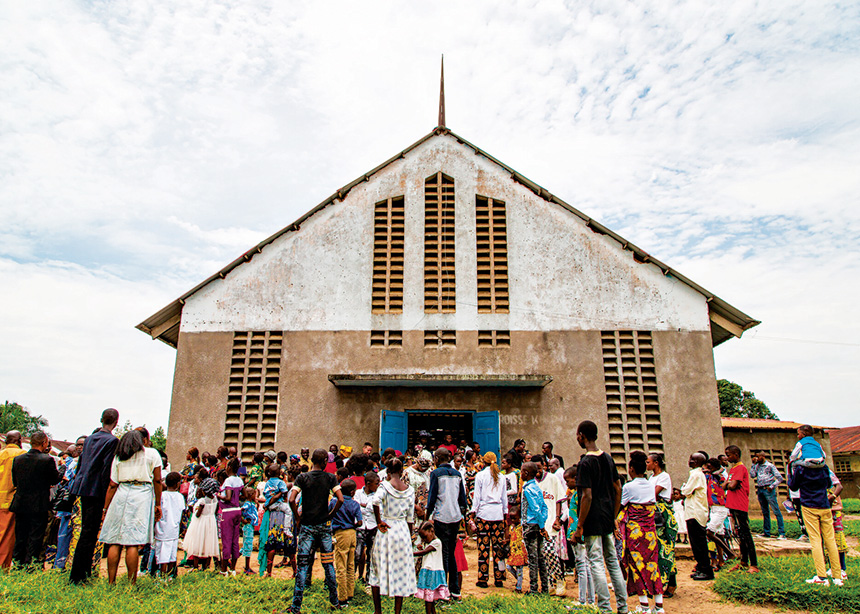


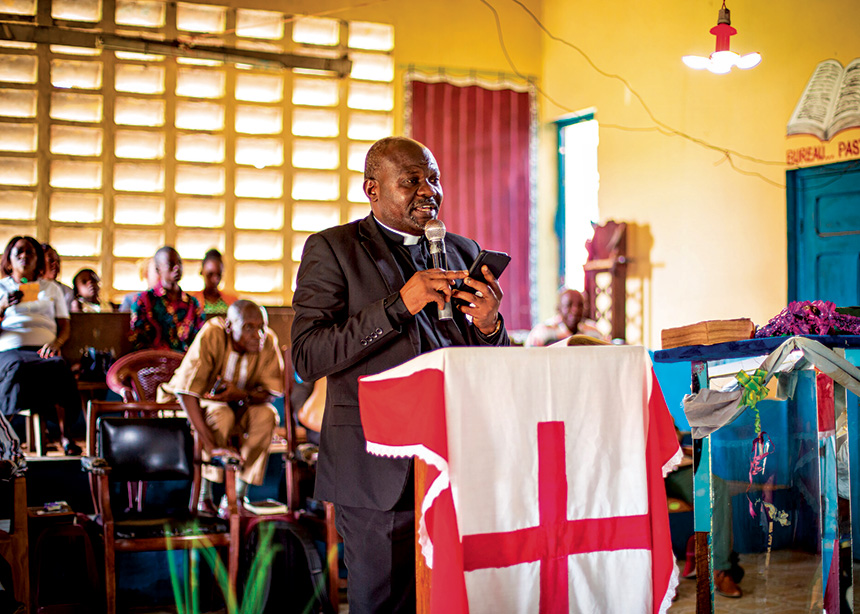
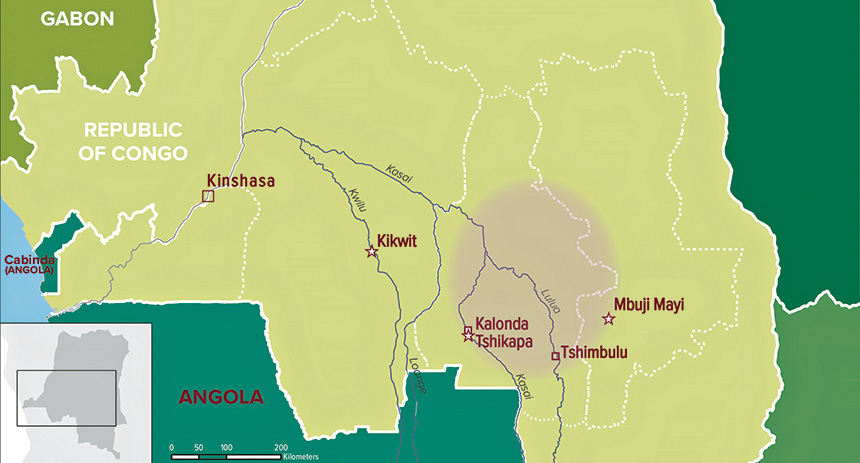
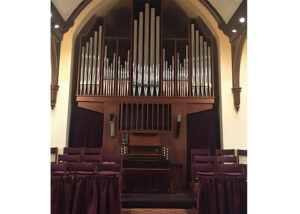

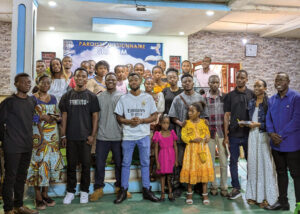

Leave a Reply
You must be logged in to post a comment.